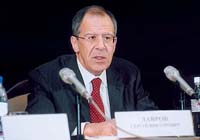Russia to take over as president of Council of Europe
On Friday at a session in Strasbourg the right of President of the Committee of Ministers of the Council of Europe – one of the largest and most influential international organizations, bringing together 46 countries from the continent – will pass from Romania to Russia. Russia joined this organization in 1996 and its presidency also coincides with the tenth anniversary of the Russian Federation’s membership of the Council. Now, for the next 6 months from 19th May to 15th November the head of the Russian Foreign Ministry Sergey Lavrov will chair the Committee of Ministers of the Council of Europe for the first time and will be able to define its agenda, and thus influence the policy of dozens of European countries.

As the head of the Russian foreign policy agency reported on Thursday, the programme of the presidency in the Council of Europe will not be revolutionary. “The Russian programme, which will be devoted to openness, is not revolutionary. The aim of our presidency is not to perform some kind of revolution or spread any propaganda for Russia. We entirely recognize that we are a member of the Council of Europe,” Lavrov told journalists in Strasbourg following a meeting with the General Secretary of the Council of Europe Terry Davis.
Nevertheless, as president of the Committee, Moscow intends to raise some quite difficult questions. It is sufficient to recall that the Russian presidency will pass under the slogan “Towards a united Europe without any dividing lines” which is extremely topical in the light of the halt to integration into the EU and the more troubled relations between Europe and Russia, and equally with other CIS countries. During the time of Russia’s presidency more than 30 events will be organized: a conference is planned to take place for human rights’ commissioners of the CE member states, as well as a the seminar “International legal guarantees for defending the rights of national minorities and the problems of their observance”, and a conference of general prosecutors of European countries. The conferences “European standards for defending the victims of terrorist attacks” and “Europe against fake medicines” are also planned.
We should note separately that, by joining the Council of Europe, our country took on “increased” commitments, and as the Russian Foreign Ministry notes, in the main they have been fulfilled, whilst “Russia is ready to work on the remaining current problems in the form of a post-monitoring dialogue”. In the view of the Foreign Ministry monitoring by itself has become obsolete and should be called off. Russia’s Foreign Ministry spoke out against the latest criticisms directed at Russia “which generally have a subjective political underlying motive”. Furthermore, on the back of growing criticism directed at Belarus from its European partners, Moscow has declared its intention to look to remove any manifestations of double standards in the activities of the CE with regard not only to Russia, but also Belarus.
However, despite persisting complaints, both the Foreign Ministry and the leadership of the Council of Europe note that in the 10 years which have passed since Russia joined the CE in 1996, the country’s legislation has been improved and its judicial system and law-enforcement practices have been modernized. According to the head of the Russian foreign policy agency, our country’s presidency in the CMCE “undoubtedly imposes certain responsibilities, and all the highest priority trends, including the provision of human rights, the supremacy of the law and the development of civil society, will be continued”.
Incidentally on Friday in Strasbourg Sergey Lavrov will take part in a series of bilateral meetings. In particular he is expected to meet with the leaders of the foreign policy agencies of Georgia, Ukraine and Serbia-Montenegro. These talks will be extremely complex, taking into account the recent announcements by Tbilisi and Kyiv over their possible withdrawal from the CIS, and also the continuing trade wars between Russia and these two neighbouring countries, and also the upcoming referendum on Montenegro’s independence, which will take place next Sunday.
Source: Strana
Translated by James Platt
Subscribe to Pravda.Ru Telegram channel, Facebook, RSS!


